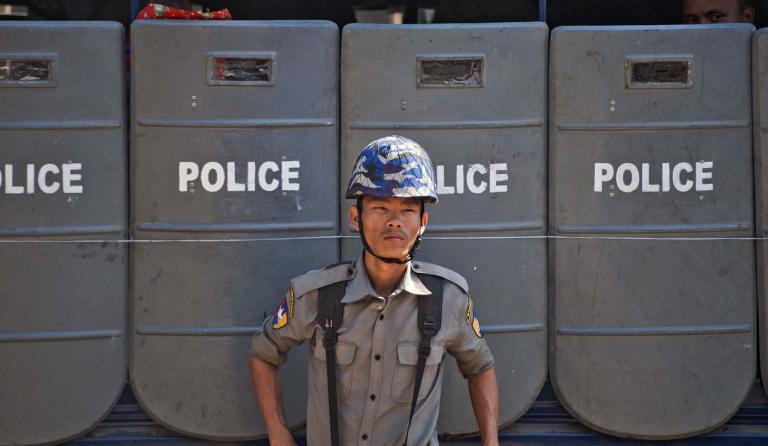Myanmar Uses Ferguson To Justify Police Brutality
Democracy and police brutality
NEW DELHI: Tension has gripped the US city of Ferguson, where a state of emergency has been imposed amidst protests marking the anniversary of the death of black teenager Michael Brown, who was shot by police in August last year. The ramifications of what is happening in Ferguson, along with the larger discourse of police brutality in the US, is however playing out in a country across the world.
Myanmar, witness to a difficult transition from military rule to a freer society, is no stranger to protests. Take the recent incident in March where protesters, largely students, gathered in Letpadan, were assaulted with the police using what was objectively rather unnecessary force. The scenes made everyone nervous that Myanmar was regressing to its despotic form, with Ye Htut, the minister of information, assuaging those concerns by bringing up the example of Ferguson. In a statement, Ye Htut cited the crackdowns on both Occupy Wall Street and Ferguson and said that, unlike in Myanmar, “nobody spoke of US democracy having backtracked.”
And what were the students’ demands that had prompted the crackdowns? Fairly straightforward things like unrestricted student unions, lessons taught in languages of ethnic minorities (that make up 30 percent of the population), independent universities that are not under tight government control, to name some of the bigger demands. These demands are located within the larger context of Myanmar’s failing education system, where a military junta has devoured the national budget over decades, allotting little to education or for that matter anything else.
The students arrived in Letpadan as part of a long march from Mandalay to the capital, when police stopped them. They were stuck in Letpadan for weeks, and when it seemed like they were finally going to be allowed to move on, police instead resorted to violence to disperse the crowd -- with many seeking refuge in homes and shelters, only to be dragged out and beaten. Later in the month, a Myanmar court pressed charges against nearly 70 students for their role in the protests, under sections that carry a jail time of ten years.
We were charged under five articles” of Myanmar’s penal code, said Kyaw Thu Thu, a detained local resident, as quoted in RFA. These five articles are Section 143 of the penal code that pertains to unlawful assembly, section 145 to joining or continuing in unlawful assembly, section 147 to rioting and section 332 to voluntarily causing harm to deter public servants. Section 505 (b) that prohibits publishing or circulating information that may cause public fear or alarm and which may incite people to commit offences against the state or public tranquility.
The Myanmar government’s reaction is excessive by any measure of democratic governance. Ye Htut, however, continued to defend it -- that too, using the example of the US. In a recent article in the Global Post, the minister said, “Even in the US individual police will react under pressure differently. There’s reasonable force and excessive force. That’s the problem we were facing ... the actions of some individuals didn’t meet the code of conduct, our rules for handling demonstrations.”





